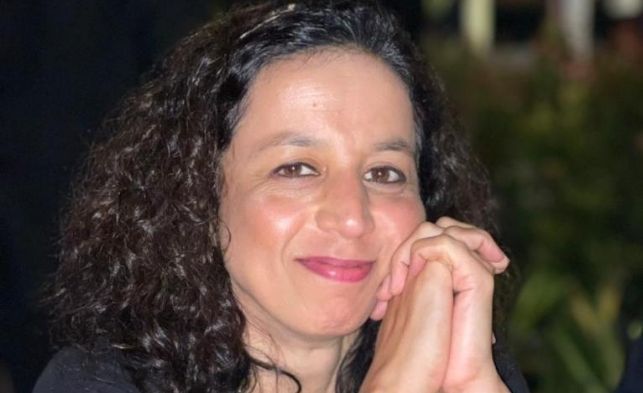Hyderabad-based hatha yoga teacher, Sakina Kapadia, started practising yoga to find relief from spondylitis. She started practising three-hours-a-week but in time, discovered the nuances of yoga and delved deeper into the subject to approach it as a teacher. Along that journey, she has found a liberal, universal appeal to the practice that applies to the human condition regardless of race, gender, religion or status. She founded the Divine Tree Yoga Shala in Hyderabad to share her learnings and create a place of nurturing and healing where her students can become the best version of themselves.
In conversation with Indica Yoga…
Sophia: When did you start practising yoga and what inspired you to start teaching?
Sakina: From being an athlete in my school days to practising Karate in my college years, I’ve always been physically active. Marriage meant relocating to a new place, new life, new people…with it came the complexity of life, and the happiness of kids. Fitness had taken a back seat. After the birth of my second child, I developed mild spondylitis and a close friend suggested yoga. I started with three-hours-a-week because that’s all I could afford to spare with two young boys. The asana practice made me feel incredibly good and I found myself looking forward to each class and the challenges that came with it. That was in 2004. My practice has only grown and become much deeper since. As the years passed, my boys took to sports and they needed guidance on warm-up and stretching, so I thought that it would be a great idea if I could get into the finer nuances of the practice to be able to guide them. That’s when the idea of learning to become a teacher was born.
Sophia: It’s refreshing to talk to a Muslim yoga teacher, and there has been an increase in Muslims practising yoga both in India and the Middle East. Your views on the equality and universal applicability of yoga?
Sakina: Most Yoga teachers are of the opinion that yoga should be practised in its totality, which would include the chanting of the mantras and slokas. Chanting is all about sound vibrations to create positive energy. The same positive energy can be created by reciting the Surahs from the Quran and I'm sure the same can be practised by people from other faiths. So in that sense, Yes, Yoga has universal applicability because the ultimate goal of Yoga is to create peace and help each individual evolve by disconnecting from the chaos and clutter of the outside world to connect to the divinity within.
Sophia: How would you describe your teaching style?
Sakina: Alignment-based flow practice
Sophia: Any yoga masters who have influenced your practice and teaching, and how?
Sakina: Though I have learnt under quite a few teachers, I’m greatly influenced by the teachings of Guruji B K S Iyengar. I’ve practised different styles of yoga but I keep finding myself going back to the Iyengar style. I sincerely respect his deep understanding of the physical body and the usage of props to help open up/relax the body, intensify and deepen the practice, making the asanas accessible to all body types. I teach a flow-based practice with a focus on alignment and the correct use of props is an important part of my teaching.
Sophia: Tell us about your vision for Divine Tree Yoga Shala?
Sakina: It started as a part time teaching job, then as a part-time self employment, and over the years, it has given me the chance to interact with so many different and lovely people. The vision is to be able to share what I have learned on this journey and make a lasting impression in people's lives to help them become better individuals
Sophia: How has practising and teaching yoga affected your personal life and relationships?
Sakina: The practice has taught me a lot - patience, the ability to stay calm in the worst of situations and think clearly, confidence to feel comfortable in my body and the ability to speak my mind without any fear. So besides teaching asanas these are the qualities that I integrate into teaching. In the process, I’m quite content in my personal life and relationships are non-judgmental.
Sophia: What are your favourite books on spirituality and what are you reading right now?
Sakina: Swami Vivekananda's take on religion and spirituality is worth a read, its content is quite complex but explains spirituality in very simple terms.
Sophia: Has your understanding of God/spirituality changed since you started practising yoga? How?
Sakina: My conditioning in my growing up years made me believe that ours is the best belief and to be born as a Bohra Muslim is above other mortals. Exposure to years of practice, travel and reading various books has expanded my understanding of God. Religions were meant to help you evolve from being materialistic towards spirituality…unfortunately in today's context Religion and Spirituality are two different things.
Sophia: Is there anything you came across in your spiritual journey that left a lasting impression on you?
Sakina: I read this piece once called “Advice from a Tree”
- Stand tall and proud
- Go out on a limb
- Remember your roots
- Drink plenty of water
- Be content with your natural beauty
- Enjoy the view
(The above became the basis behind the name Divine Tree - The Yoga Shala)
And the poem below:
Khalil Gibran on Fear
It is said that before entering the sea
a river trembles with fear.
She looks back at the path she has travelled
From the peaks of the mountains,
The long winding road
Crossing forests and villages
And in front of her
She sees an ocean so vast
That to enter there seems nothing more
Than to disappear forever.
But there is no other way
The river cannot go back
Nobody can go back.
To go back is impossible in existence.
The river needs to take the risk
Of entering the ocean,
Because only then will fear disappear,
Because that's where the river will know
It's not about disappearing into the ocean,
But of becoming the ocean.
Sophia: What can we expect from you in the future?
Sakina: I'm very passionate about my practice and I love to travel. The plan is to combine both so that we can organise the best yoga retreats in the heart of nature.
For more information on Sakina, visit The Divine Tree Yoga Shala.





